Oh, to be a cable-cutting millennial, swimming helplessly in a myriad of par-to-subpar Netflix/Hulu/Amazon Prime streaming options whilst looking for a movie to watch on a lazy Sunday night. Do you take a gamble on something that doesn’t look all that good, but is at least new and somewhat current? Do you return to an old favorite that you’ve seen a million times, looking for a safe space rather than excitement in the midst of an increasingly cacophonous modern and fast-paced society? Do you just give up and turn on The Office for the millionth time? Lo and behold, before you know it, it’s time for bed. As I think I’ve said before, this struggle to me embodies the human condition – it’s an exercise in risk and reward, the safe versus the unknown, the familiar old flame pitted against the potential new passionate lover.
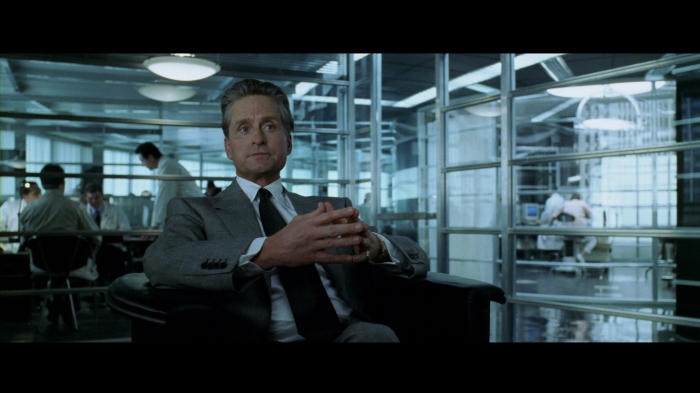
Me watching Season 4 of The Office for the 275,475th time.
With all of this overly romanticized language in mind, and while it was tempting to take a friend’s suggestion, go completely off script this week, and instead scathingly review the 47-3 trouncing of my favorite NFL team, I want to talk to you this week about The Game. Directed by David Fincher, who’s known for such pitch-black spellbinders as Se7en, Fight Club, The Social Network, Gone Girl, and Zodiac (which I’ve already talked about here), The Game stars Michael Douglas, and chronicles a rich man’s birthday journey into a perplexing world of a real-life game designed to force him to question the distinction between what’s real and what’s manufactured (I’m not going to spend much more time detailing what the movie is about, so if you want to know more, maybe watch this trailer, which is only marginally more informative, and much more visually disturbing). Often cerebral, thrilling, and at times playing out like an escape room set to the silver screen, The Game was an overall enjoyable ride, and a free one at that, provided you have a Netflix subscription. When it was originally released way back in 1997, critics and audiences largely felt the same, calling into question the film’s arguably dubious ending, but also lauding Fincher’s typical but nonetheless continually entrancing dark atmosphere (certainly darker than Game Night, in case you’re wondering). All told, you can do far worse if you’re scrolling Netflix and trying to navigate the doldrums of cinematic ennui that so often seem to marry themselves to on-demand content viewing.
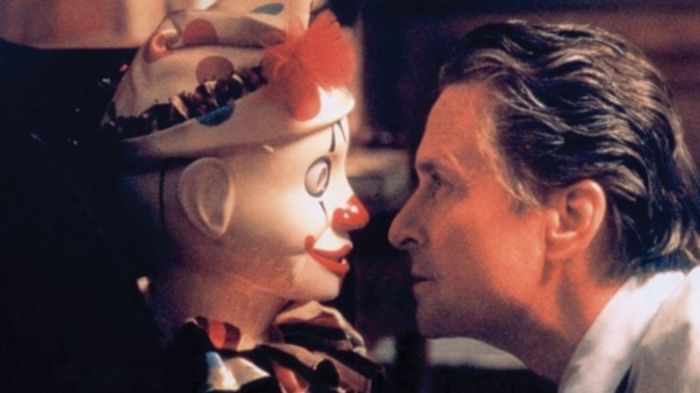
Warning for those with clown phobias – there are a few scenes with clowns which are inanimate but still creepy as all hell.
The Game‘s greatest strengths are its premise and its director, which go as hand-in-hand as the premise and director do for any great movie. The overwhelmingly mysterious nature of the plot, which all the while encourages the audience to look for clues as to how Michael Douglas can overcome the various adversities thrown at him by the shrouded corporation serving as his gamemaker and win his game, is perfectly suited for David Fincher’s talents. As the plot itself goes, don’t expect many stunning twists – if anything, it’s more predictable than not, but my theory is that that feeds into the enjoyment, and at the very least it did in my case. The Game never really treads fully into horror territory – in fact, it doesn’t even really come close if you ask me – but I also feel that it operates on a governing principle very similar to many great films of that genre, at times fully embracing the M.O. of getting the main character to go through a door in a dark corner when every conscious audience member is screaming that a killer lurks behind it. Another comparison that can be easily drawn: maybe one of the reasons that I enjoyed The Game is because I also enjoy watching a magician perform. Especially in terms of its setpieces, which are few but significant, The Game plays out like one long magic trick – a magic trick whose secrets the audience will eventually have revealed to them. The beauty of The Game and its writing is that the audience wants to find out for itself what those secrets are before the moment where it’s all laid bare for them comes.
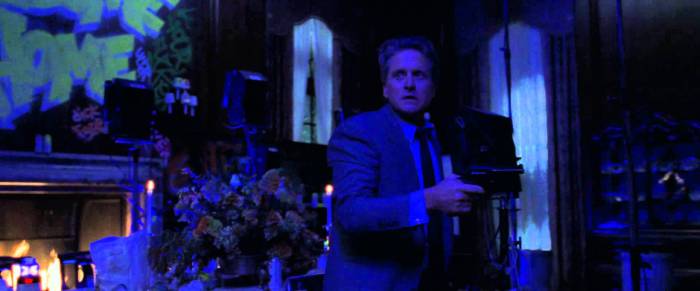
Another solid use of White Rabbit in the name of filmmaking.
Where I primarily take issue with The Game is in the caliber of its acting, starting first and foremost with its female lead Deborah Kara Unger – an actress who has little to no notable entries in her filmography aside from this one, and who is given the formidable task of acting against seasoned vet Michael Douglas. At times, Unger’s performance is comically bad, but what’s so interesting about The Game and its premise is that it’s hard not to wonder if this is simply another part of the ruse at the film’s core. To put it another way – Unger is playing a participant in Douglas’ character’s “game,” and to this end, she’s really a pawn in said game – she’s for lack of a better term performing within a performance. This is all to say that perhaps Unger decided to play her role – essentially an actress – as someone who isn’t very good at what they do, but as someone who’s able to often fool Douglas’ Nicholas Van Orton at countless turns all the same. My money is still on the idea that Unger simply doesn’t turn in a good performance, but it’s worth thinking about nonetheless.
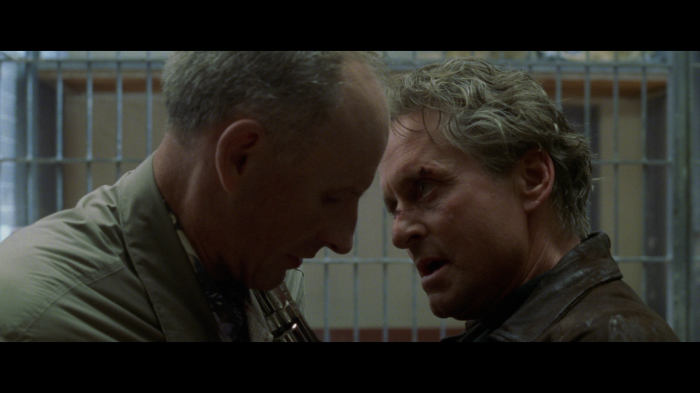
James Rebhorn and Michael Douglas maybe about to kiss?
Which brings us to Michael Douglas himself. As I’ve already said, Douglas is a seasoned veteran, having acted in such memorable hits as Wall Street and Basic Instinct, but even when his performance is juxtaposed with the oftentimes downright cringe-inducing Unger’s, it’s hard to make any argument that it’s all that good. Don’t get me wrong, it’s certainly not bad – it’s exactly fine, which is probably why you don’t hear about this movie much when Douglas’ name comes up. But as the film’s central figure, Douglas’ occasionally flat performance keeps The Game from elevating itself to what I feel that it could have been – a finished product greater than the sum of its parts. This could probably be said of most of the acting throughout, though the strikingly young Sean Penn (acting in a small role as Nick’s playboy brother and gift-giver Conrad) and James Rebhorn (one of Hollywood’s many living breathing examples of “that guy you know from that thing”) are pretty entertaining when all is said and done.
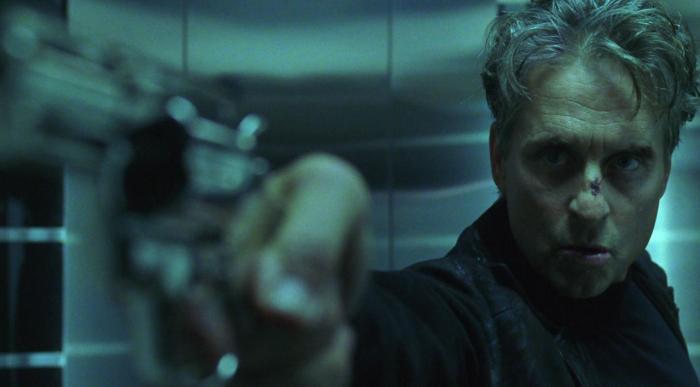
Classic David Fincher blue filter on display here.
A final drawback to note: I’ll agree with the critics that the ending of The Game left a little something to be desired – without getting into spoiler territory, I’ll say that it pulled a double-move when a single move would have done just fine, swapping out an ending that I think would have been far better and far more befitting of its plot and (at that point well-developed) characters for a denouement with much less emotional impact. With that said, the film’s main character undeniably finishes his game, win or lose, as a changed man, and while the finish line is in a sense a bit of a head-scratcher, the race to it is unquestionably ominous fun.
[…] So, to summarize all of this, let’s just say that Night Moves left a heck of a lot to be desired, in my opinion squandering a great cast and a decent premise. It seems that I disagree somewhat definitively with Rotten Tomatoes on this one – I’m far more in line with the audience score than that of the critics, who have reached a consensus that it’s some kind of art – but in this case I’m happy to do so. Night Moves is currently available on Amazon Prime Video, but as streaming options go, you can do far better than this, if only by taking my advice from last week and watching David Fincher‘s The Game. […]
LikeLike